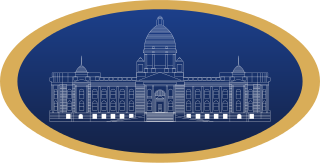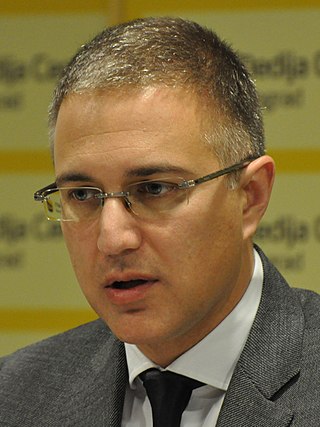 |
|---|
Parliamentary elections were held in the People's Republic of Serbia on 22 November 1953, alongside federal elections. [1]
 |
|---|
Parliamentary elections were held in the People's Republic of Serbia on 22 November 1953, alongside federal elections. [1]
Prior to the elections, the National Assembly was made bicameral with the creation of a Council of the Republic (174 members) and Council of Producers (117 members). [2] [1]
The elections were the first held with ballot papers. Previously balls had been used. [2]
Of the 4,493,644 registered voters, 3,847,948 (86%) voted in the elections for the Council of the Republic. [1]

The National Assembly is the unicameral legislature of Serbia. The assembly is composed of 250 deputies who are proportionally elected to four-year terms by secret ballot. The assembly elects a president (speaker) who presides over the sessions.

The Parliament of Serbia and Montenegro was the legislative body of Serbia and Montenegro. The parliament was unicameral and was made up of 126 deputies, of which 91 were from Serbia and 35 were from Montenegro. The parliament was established in 1992 as the Federal Assembly of Yugoslavia as a direct replacement for Parliament of Yugoslavia and was renamed in 2003. With the declaration of independence of Montenegro on June 3, 2006, the parliament was dissolved.
There are five types of elections in Slovakia: municipal elections, regional elections, parliamentary elections, presidential elections and elections to the European Parliament. All four types of elections are normally held after fixed periods, although early elections can occur in certain situations. Elections are conventionally scheduled for a Saturday - the polls normally open at 7:00 in the morning and close at 22:00 in the evening. Citizens aged 18 years or older are eligible to vote. Those serving prison sentences for particularly serious crimes, as well as those deprived of legal capacity, including persons with mental disabilities, are denied the right to vote. Voter registration is passive and decentralized with the voter register maintained by municipalities based on the permanent residence register. Voter lists are updated continuously based on municipal records and input provided by state institutions or other municipalities. Voters may verify their data in voter lists, and, if necessary, request correction until the day before election day. On election day, a voter can be added to a voter list upon presenting an identity card with proof of residency. Some 4.4 million voters are registered and valid to vote in the elections. Voters are only able to vote from abroad during the Parliamentary Elections in Slovakia.
Parliamentary elections to the Assembly of Kosovo have been held four times since 1999 with the latest in December 2010. The Assembly was an institution within the Provisional Institutions of Self-Government (PISG) established by the United Nations Interim Administration Mission in Kosovo (UNMIK) to provide 'provisional, democratic self-government' in advance of a decision on the final status of Kosovo. Kosovo, formerly a province of Serbia, came under UN administration in 1999 and unilaterally declared its independence in February 2008. The Assembly elected in 2007 continued in office after the declaration of independence.

The Alliance of Independent Social Democrats is a Serb political party in Bosnia and Herzegovina. Founded in 1996, it is the governing party in Republika Srpska, with its leader, Milorad Dodik, serving as the current president of Republika Srpska. The party's vice-president, Željka Cvijanović, is the current member of the Presidency of Bosnia and Herzegovina, while SNSD member Radovan Višković is the current prime minister of Republika Srpska.

The Politics of Serbia are defined by a unitary parliamentary framework that is defined by the Constitution of Serbia in which the president, currently Aleksandar Vučić, is the head of state while the prime minister, currently Ana Brnabić, is the head of government. Executive power is exercised by the Serbian government and the President of Serbia. Legislative power is vested in the unicameral National Assembly which is composed of 250 proportionally elected deputies. The judiciary is independent and is headed by the Supreme Court of Cassation, which is also the highest court in Serbia.

The Autonomous Province of Kosovo and Metohija, commonly known as Kosovo and abbreviated to Kosmet or KiM, is an autonomous province defined by the Constitution of Serbia that occupies the southernmost part of Serbia. The territory is the subject of an ongoing political and territorial dispute between Republic of Serbia and the partially recognised Republic of Kosovo. Its claimed administrative capital and largest city is Pristina.

The Parliament of Yugoslavia was the legislature of Yugoslavia. Before World War II in the Kingdom of Yugoslavia it was known as the National Assembly, while in the Socialist Federal Republic of Yugoslavia the name was changed to Federal Assembly. It functioned from 1920 to 1992 and resided in the building of the House of the National Assembly which subsequently served as the seat of the Parliament of Serbia and Montenegro and since 2006 hosts the National Assembly of Serbia. The Federal Assembly was the highest organ of state power and the only branch of government in the country, with all state organs subservient to it under the principle of unified power as it was a one-party state, with the League of Communists of Yugoslavia as the sole legal party in the country. Most of the Federal Assembly's actions simply rubber stamp the party's decisions.

Elections were held on municipal, provincial, republican and federal levels in Yugoslavia from its foundation in 1918 throughout its breakup in 1992.
Local elections were held in Serbia over two rounds on 3 November and 17 November 1996, concurrently with the 1996 Vojvodina provincial election; the first day of voting also coincided with the 1996 Yugoslavian parliamentary election and the 1996 Montenegrin parliamentary election. This was the third local electoral cycle held while Serbia was a member of the Federal Republic of Yugoslavia and the last time that Serbia oversaw local elections throughout Kosovo and Metohija until its controversial decision to hold elections in 2008.

Nebojša Stefanović is a Serbian politician who served as deputy prime minister of Serbia from 2016 to 2022 and as minister of defence from 2020 to 2022. A member of the Serbian Progressive Party (SNS), he previously served as president of the National Assembly of Serbia from 2012 to 2014 and as minister of internal affairs from 2014 to 2020.
The Social Democratic Party is a centre-left political party in Serbia.
The Green Party was a political party in Serbia, based in Novi Sad. The party also represented the Slovak minority in Serbia.

Aleksandar Šešelj is a Serbian politician. He served in the National Assembly of Serbia from 2017 to 2020 as a member of the far-right Serbian Radical Party. Šešelj is the son of Radical Party leader Vojislav Šešelj.
Local elections were held in Serbia on 19 September and 3 October 2004, concurrently with the 2004 Vojvodina provincial election. This was the only local election cycle held while Serbia was a member of the State Union of Serbia and Montenegro.
Local elections were held in Serbia on 24 September 2000, concurrently with the first round of voting in the 2000 Yugoslavian general election and the 2000 Vojvodina provincial election. This was the fourth and final local electoral cycle to take place while Serbia was a member of the Federal Republic of Yugoslavia.
A small number of municipalities in Serbia held local elections in 2002. These were not part of the country's regular cycle of local elections but instead took place in jurisdictions where the local government had fallen.
A small number of Serbian municipalities held local elections in 2003. These were not part of the country's regular cycle of local elections but took place in certain jurisdictions where the local government had fallen.
Parliamentary elections were held in Serbia on 16 March, 7 April and 21 April 1986 to elect delegates of the Assembly of SR Serbia. In addition to the parliamentary election, local elections in Serbia and federal elections in the Socialist Federal Republic of Yugoslavia were held in the same year. The election was conducted under an electoral system that was established in the 1974 Yugoslav Constitution. Serbia in 1986 was also a one-party state that was governed by the League of Communists of Serbia (SKS).
Parliamentary elections were held in the People's Republic of Serbia on 10 November 1946 to elect the 287 members of the constituent assembly.